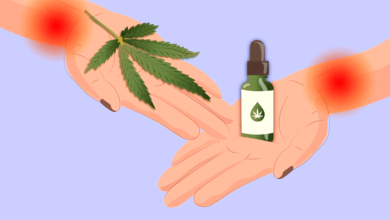CBD for Migraines: Natural Relief Without the Side Effects
In this article, we’ll explore how CBD for migraines could provide natural relief without the adverse effects commonly associated with conventional treatments.

Migraines are more than just headaches—they are a debilitating neurological condition that affects millions of people worldwide. Characterized by throbbing pain, nausea, sensitivity to light and sound, and visual disturbances, migraines can disrupt daily life significantly. While traditional treatments, such as prescription medications, can offer relief, they often come with unwanted side effects. This has led many to explore natural alternatives like CBD for migraines.
Cannabidiol (CBD), a non-psychoactive compound derived from the cannabis plant, has gained significant attention for its potential therapeutic benefits, particularly in pain management and neurological conditions. In this article, we’ll explore how CBD for migraines could provide natural relief without the adverse effects commonly associated with conventional treatments.
Understanding Migraines: Causes and Symptoms
Before delving into how CBD for migraines can help, it’s crucial to understand what triggers these painful episodes. Migraines are often linked to:
- Hormonal changes (especially in women)
- Stress and anxiety
- Certain foods and drinks (e.g., alcohol, caffeine, processed foods)
- Sensory stimuli (e.g., bright lights, loud sounds)
- Sleep disturbances
- Environmental factors (e.g., weather changes)
Symptoms go beyond headaches and can include nausea, vomiting, dizziness, aura (visual disturbances), and extreme sensitivity to light and sound. Many sufferers experience these symptoms for hours or even days.
Traditional treatments include over-the-counter pain relievers, triptans, anti-nausea medications, and preventive drugs like beta-blockers or antidepressants. However, these treatments may cause drowsiness, dependency, digestive issues, and other side effects, prompting a search for safer alternatives like CBD for migraines.
What is CBD?
CBD, short for cannabidiol, is one of over 100 cannabinoids found in the cannabis plant. Unlike THC (tetrahydrocannabinol), CBD does not produce a “high.” Instead, it interacts with the body’s endocannabinoid system (ECS), which plays a role in regulating pain, inflammation, mood, and sleep.
CBD is available in various forms, including CBD oil, tinctures, capsules, edibles, and topical creams. Its versatility and minimal side effect profile make it an attractive option for people seeking natural remedies for chronic pain and neurological conditions such as migraines.
How Does CBD Help with Migraines?
1. Anti-Inflammatory Properties
One of the leading theories behind migraines involves inflammation of the blood vessels in the brain. CBD’s potent anti-inflammatory effects can help reduce this inflammation, potentially alleviating the root cause of migraine pain. By modulating cytokine production and immune cell activation, CBD for migraines may calm the overactive immune response linked to inflammation.
2. Pain Modulation
CBD interacts with CB1 and CB2 receptors in the endocannabinoid system, influencing how pain signals are processed. By altering these pain pathways, CBD may reduce the severity and duration of migraine headaches. This natural analgesic effect makes CBD for migraines a promising tool in pain management without the gastrointestinal or cardiovascular risks associated with common painkillers.
3. Reduction of Nausea
Nausea and vomiting are frequent symptoms of migraines. Research indicates that CBD may regulate serotonin levels, a neurotransmitter involved in mood and nausea control. By balancing serotonin activity, CBD for migraines may help diminish queasiness and discomfort, improving the overall quality of life during a migraine episode.
4. Stress and Anxiety Relief
Stress is a common migraine trigger, and CBD is known for its calming and anti-anxiety properties. By reducing cortisol levels and promoting relaxation, CBD for migraines may not only alleviate migraine symptoms but also help prevent their onset.
5. Improved Sleep Quality
Poor sleep is both a trigger and a consequence of migraines. CBD has been shown to support healthier sleep patterns by promoting relaxation and addressing issues like insomnia. A well-rested brain is less prone to migraine attacks, making CBD for migraines a valuable preventive tool.
Scientific Evidence Supporting CBD for Migraines
While research is still evolving, several studies support the potential of CBD for migraines. A study published in the journal Frontiers in Neurology found that cannabinoids, including CBD, may reduce migraine frequency and intensity by modulating the endocannabinoid system. Another study conducted by the European Academy of Neurology reported that cannabis-based compounds may be more effective than some prescription medications in managing migraine pain.
Moreover, preclinical studies have demonstrated CBD’s efficacy in reducing neuroinflammation and oxidative stress, both of which are believed to contribute to migraine pathophysiology.
How to Use CBD for Migraines
When considering CBD for migraines, it’s essential to select the right type and dosage for optimal results:
Types of CBD Products
- CBD Oil/Tinctures: Fast-acting when taken sublingually (under the tongue), ideal for acute migraine relief.
- CBD Capsules/Edibles: Convenient for long-term preventive use, but slower-acting due to digestion.
- CBD Topicals: Target localized pain when migraines are accompanied by neck and shoulder tension.
- CBD Vape Products: Offer rapid absorption but may not be suitable for everyone due to potential respiratory concerns.
Dosage Considerations
There is no universal dosage, as optimal CBD intake depends on factors like body weight, metabolism, and migraine severity. A common approach is to start low (e.g., 10-20 mg of CBD) and gradually increase until desired relief is achieved. Consulting with a healthcare provider familiar with CBD is recommended, especially if you are taking other medications.
Benefits of CBD for Migraines Compared to Traditional Treatments
1. Minimal Side Effects
Unlike common migraine medications that can cause dizziness, drowsiness, dependency, and gastrointestinal issues, CBD for migraines typically presents fewer side effects. Most users report only mild reactions such as dry mouth or slight drowsiness.
2. Non-Addictive Nature
CBD is non-psychoactive and non-addictive, making it a safer option for long-term use compared to opioids or other prescription drugs often prescribed for migraine pain.
3. Holistic Relief
CBD addresses not just pain but also related symptoms like anxiety, nausea, and sleep disturbances. This comprehensive approach helps manage migraines from multiple angles, promoting overall wellness.
Potential Side Effects and Precautions
While CBD for migraines is generally considered safe, some individuals may experience:
- Dry mouth
- Fatigue
- Changes in appetite
- Interaction with other medications (e.g., blood thinners)
It’s essential to source CBD products from reputable brands that provide third-party lab testing to ensure purity and potency. Avoid products with synthetic additives or contaminants.
Additional Natural Remedies to Complement CBD
To enhance the benefits of CBD for migraines, consider combining it with other natural strategies:
- Magnesium supplements: Deficiency is linked to migraines.
- Coenzyme Q10 (CoQ10): Known for supporting mitochondrial health.
- Essential oils: Lavender and peppermint oils may help reduce headache tension.
- Hydration: Dehydration is a common migraine trigger.
- Mindfulness techniques: Meditation, yoga, and deep breathing can reduce stress levels.
Final Thoughts: Is CBD for Migraines Right for You?
The growing body of anecdotal and scientific evidence suggests that CBD for migraines may offer natural, effective relief without the drawbacks of conventional medications. Its ability to reduce inflammation, modulate pain, alleviate nausea, and lower stress levels makes it a promising holistic approach for migraine sufferers.
However, as with any supplement, individual results may vary. Always consult with a healthcare provider before starting a CBD regimen, especially if you are on other medications or have underlying health conditions.
If you are seeking a natural, side-effect-free alternative to traditional migraine treatments, CBD for migraines could be the solution you’ve been looking for.









